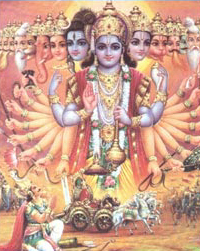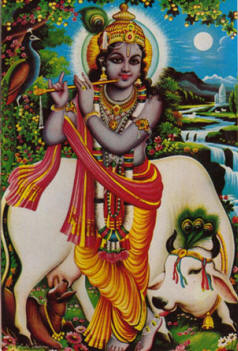Bhakti Yoga - The Yoga of Devotion - Part 1
 The
experience of seeing the Vision of the Cosmic Form has left Arjuna trembling
with fear and he begs his friend to return once more to his familiar four-armed
human form. Krishna tells Arjuna that it is only by the power of his Grace
(prasannena) that Arjuna can see this Vision. No one but Arjuna has seen this
(XI.47-48). The Vision cannot be seen by the study of the sacred Sanskrit
texts, the Vedas, or by sacrifices, offerings, and rituals, or even by severe
(ugraih) austerities (tapobhir). Thus it is Krishna’s Grace alone that brings
the Vision of the Cosmic Form.
The
experience of seeing the Vision of the Cosmic Form has left Arjuna trembling
with fear and he begs his friend to return once more to his familiar four-armed
human form. Krishna tells Arjuna that it is only by the power of his Grace
(prasannena) that Arjuna can see this Vision. No one but Arjuna has seen this
(XI.47-48). The Vision cannot be seen by the study of the sacred Sanskrit
texts, the Vedas, or by sacrifices, offerings, and rituals, or even by severe
(ugraih) austerities (tapobhir). Thus it is Krishna’s Grace alone that brings
the Vision of the Cosmic Form.
As Krishna returns to his gentle (saumya) handsome and wonderful (vapus) human form, Arjuna regains his composure (XI.51). Krishna tells his friend that even the gods are always desiring this Vision of the Cosmic Form (XI.52). Again Krishna says the Vision cannot be experienced by the study of texts, sacrificial offerings, and austerities. The Supreme Being can only be known and entered into through bhaktya ananyaya, one-pointed devotion (XI.54).
Devotion Invokes God’s Grace
By this verse we are led into the beginnings of an understanding of Bhakti Yoga, the Yoga of Devotion. Krishna’s teaching in the Bhagavad Gita is a merging of Knowledge as Wisdom (jnana yoga), work without attachment to results (karma yoga), and devotion to the God-within (bhakti yoga).
In the final verse of Book XI, Krishna tells Arjuna that whoever works for God, in the wisdom of non-attachment to results, with the knowledge that God is within all beings and therefore is free from enmity (nirvairas) for any - they attain the Supreme Self, Paramatman (XI.55). They come Home!
Nothing more remains to be known ...
The commentary in the Gambhirananda translation is that after this, there remains nothing to be done. This is a reflection of Krishna’s earlier statement when he tells Arjuna that after learning what Krishna will teach him, here in the moment of the Bhagavad Gita, nothing more will remain to be known in this world (VII.2). The sphinx-like and transcendental secret possibility of reaching the end of the ‘game’ in this universe is something to contemplate deeply and profoundly.
“Stand up and fight!”
In the Mahabharata before Krishna’s teaching of the Bhagavad Gita on the battlefield Kurukshetra, there are many debates over the actual decision to go to war. In one such discussion Krishna makes clear his view on the subject of performing acts (karma) in this world as opposed to withdrawing from it, and reveals that he holds nothing higher than taking action.
‘One school says that it is by work that we obtain salvation and another school says that it is by putting aside work and through knowledge, that we attain salvation’ (M.N.Dutt; Udyoga Parva, Ch.29.6). Krishna then reminds us that we cannot even begin to learn knowledge unless we also perform the act of eating. Sustaining life requires action. We cannot concentrate on fine words when we are hungry.
‘That knowledge alone bears fruit, which does work, not others’ (ibid.Ch.29.7). Our actions bear fruit and these fruits are the visible evidence of our intentions. Our intentions are based in what we know. Knowledge of the Real that does not change you is Knowledge that either has not yet been truly and deeply learned, or it is false. Our behavior, our actions, what we in fact do in this world is the proof of what we Know.
This reminds me of the words used by Jesus when he teaches people how to distinguish a false prophet from a true one. Jesus says, ‘By their fruits you will know them’ (Matthew 7.16). We are all known by our actions. We act as we believe. The well-being of the world (lokasamgraha) cannot be achieved by one who withdraws from it.
The uttering of a fool and of a weak man
‘... it has been ordained by the Creator that through work, results work ... Therefore the opinion that anything other than work is good, is nothing but the uttering of a fool and of a weak man’ (Udyoga Parva, Ch.29.8). Here is Krishna’s doubtless view of taking action in this world and therefore we are not surprised when he later urges Arjuna to stand up and fight (BhG.II.37-38).
The Indian scholar Krishna Chaitanya/KK Nair makes a heartfelt case for action over withdrawal from the world in his writings, especially in ‘The Betrayal of Krishna’. He blames what he calls the schoolmen beginning with ‘the subversion’ by Sankara for misunderstanding and ultimately betraying Krishna’s teachings.
My generation - the lost ones
On a personal note, I often wonder how my country might have been a different place today if so many of my generation had not misunderstood what was then being sold as the wisdom of the East, and sadly made the drug induced choice to turn on and drop out. I am not blaming the wisdom of the East, only those who sadly through their own misinterpretations passed on the idea of abandoning the world. History shows that there were also those in the Christian faith who sought to leave this world.
The consequences of these escapist attitudes were personally tragic to so many in the 1960s and 70s, destroying lives which might have been brilliant and productive. This choice of dropping out ended definitely the potential possibilities of those who might have made America today a very different political entity.
Only Love can motivate us to act spontaneously in Joy
Krishna’s statement that he holds ‘nothing higher than acting’ reveals that his teaching is indeed one that embraces an active participation in the world. As Krishna so bluntly states, he who thinks otherwise is merely uttering the opinion of ‘a fool and a weak man.’
This working for the world does little good when motivated by ego. The small identity ego-self is still under the rule of guna-maya and cannot - however hard it tries with all those good intentions that pave the road to hell - achieve much that is not tainted by its own self-serving ambition. The kind of action that Krishna is speaking of comes from an enlightened consciousness, the frequency waveform that is motivated by the Knowledge of its Oneness with the All. The question is how do we get there - meaning to that place of Wisdom and the Realization that we are those we serve.
The clue is in our ordinary lives. What would make us want to work for the well-being of others? What drives a father to labor day after day in some boring job to put food on the table and support his family? What motivates the woman who often holds down a job and then comes home to cook and clean, and perform all those endless tasks that every mother finds herself bound to. There is only one answer - and that is Love.
Love is the only force powerful enough to move any of us to work ceaselessly and possibly in the spirit of spontaneous Joy. Work done out of Love resonates with that same frequency waveform in which the Creator works. God doesn’t need anything and yet, as Krishna says, the Creator works tirelessly to sustain and support the world. God’s Love is the force that provides the source for and permeates the All. ‘And so there remain Faith, Hope, and Love - these three; and of these the greatest is Love’ (1 Corinthians 13:13).
Book XII - Bhakti Yoga - Ganguli’s Translation with my comments
 In Book
XII Krishna teaches Arjuna how the frequency waveform Devotion can assure the
attainment of liberation (moksha) from perpetual rebirth and transmigration.
Book XII is brief, and I quite like Ganguli’s translation of this section. It’s
poetic images carry a sense of the feeling conveyed here, and so I will quote
him and make my own comments.
In Book
XII Krishna teaches Arjuna how the frequency waveform Devotion can assure the
attainment of liberation (moksha) from perpetual rebirth and transmigration.
Book XII is brief, and I quite like Ganguli’s translation of this section. It’s
poetic images carry a sense of the feeling conveyed here, and so I will quote
him and make my own comments.
The Better Way
Arjuna asks Krishna who ‘takes the better way of faith and life’ - the ones who worship the Lord with devotion, or those who worship that which is invisible, eternally unmanifest, aksharam avyaktam (XII.1).
Akshara, the Imperishable, is ‘neither gross nor subtle, neither short nor long ... neither air nor akasha. It is unattached. It is without taste or smell, without eyes or ears, without tongue or mind. It is non-effulgent, without vital breath or mouth, without measure, and without exterior and interior’ (Brihadaranyaka Upanishad III.viii.8).
The Imperishable Unmanifest can only be defined by what it is not and therefore you can see the difficulty in focusing on this invisible aksharam avyaktam. Krishna understands that for most us us here in the Kali Yuga, it is easier to utilize our natural inclination to focus on what we love and therefore he recommends the Path of Devotion along with Knowledge (jnana yoga) and good works (karma yoga).
Whoever serve Me - as I show Myself -
Constantly true, in full devotion fixed,
Those hold I very holy.
Krishna answers that he holds the ones who are steadfast (yuktas) and keep their mind on God to be the most devoted (yuktatama). Supreme faith (sraddhaya paraya) in the Knowledge that has revealed our goal is born in the Sattvic guna (XII.2). This is why an even temperament is the fertile ground that engenders a higher consciousness. Only the frequencies of the guna sattva will produce a similitude (sadharmya) with the Supreme Self (Paramatman).
But who serve -
Worshipping Me, The One, The Invisible,
The Unrevealed, Unnamed, Unthinkable,
Uttermost, All-pervading, Highest,
Sure -
Who thus adore Me, mastering their sense,
Of one set mind to all, glad in all good,
These blessed souls come unto Me.
But those who worship God as the Imperishable (aksharam), the Unmanifest (avyaktam), the omnipresent all-pervading (sarvatragam), who control the five senses, and are happy wanting the welfare of all (sarvabhutahite) - they come to God also (XII.3-4).
Yet, hard
The travail is for such as bend their minds
To reach th' Unmanifest. That viewless path
Shall scarce be trod by man bearing the flesh!
Krishna realizes how hard it is for those of us in human form to focus on the unseen (XII.5). We are warm blooded creatures who need to love more than the Unmanifest. However it is true that whatever Path we follow, whatever we worship, our diverse prayers and many mantras are all directed to the same goal. That goal is to attune the frequencies in our heart, mind and being to the supremely Blissful Consciousness of the God-within, the One that permeates the All. By all pathways are we eventually led from the unreal to the Real!
But whereso any doeth all his deeds
Renouncing self for Me, full of Me, fixed
To serve only the Highest, night and day
Musing on Me -
him will I swiftly lift
Forth from life's ocean of distress and death,
Whose soul clings fast to Me.
Krishna promises to lift up out of eternal transmigration - the ocean of birth and death - the one who thinks of God, whose mind is absorbed in and whose thoughts have entered into the Supreme Self (XII.7).
 तेषामहं
समुद्धर्ता
मृत्युसंसारसागरात्
.
तेषामहं
समुद्धर्ता
मृत्युसंसारसागरात्
.
भवामि
नचिरात्पार्थ
मय्यावेशितचेतसाम्
.. १२-
७..
teṣāṃ ahaṃ samuddhartā
mṛtyusaṃsārasāgarāt
bhavāmi na cirāt pārtha mayy āveśitacetasām 12.7
The object of leaving the small ego-self behind, with all its endless guna-maya compulsions, and fixing the mind on the God-within is to lift your consciousness to a similitude (sadharmya) of frequency with the Supreme Self (Paramatman). You become immersed in the One, your own Self and Home.
Cling thou to Me!
Clasp Me with heart and mind! so shalt thou dwell
Surely with Me on high.
‘Cling to Me!’ is the expression of the idea that the Supreme Being also desires us to return Home. God wants us when we want God. Imagine the Joy of the Creator when even one chooses the subtle fire in the Heart over all the temptations of the world!
But if thy thought
Droops from such height; if thou be'st weak to set
Body and soul upon Me constantly,
Despair not! give Me lower service!
If the aspirant cannot keep the mind focused on God, then we need not despair. We can practice union (yoga) by meditating; such practice will lead us to better one-pointed focus of mind (XII.9).
I seek
To reach Me, worshipping with steadfast will;
And, if thou canst not worship steadfastly,
Work for Me, toil in works pleasing to Me!
For he that laboureth right for love of Me
Shall finally attain!
If one cannot practice in meditation, then we can do good works (mat-karma) in the name of the Lord. By practicing Karma Yoga as altruistic acts without attachment, we can attain the Perfection (siddhim) what we seek (XII.10).
But, if in this
Thy faint heart fails, bring Me thy failure! find
Refuge in Me! let fruits of labour go,
Renouncing hope for Me, with lowliest heart,
So shalt thou come;
 If our
efforts only meet with failure, then offer even that failure to the God-within.
God is our effort, our heart when faint or determined, and both our failure and
success. God is All! If we cannot do good works, if our mind is distracted by
the external in the temporal illusory hologram, then Krishna tells us to offer
everything to the God-within. In self-restraint (yatamavan), we remain devoted
to the Lord and give up all thoughts of the fruits of our acts (XII.11).
If our
efforts only meet with failure, then offer even that failure to the God-within.
God is our effort, our heart when faint or determined, and both our failure and
success. God is All! If we cannot do good works, if our mind is distracted by
the external in the temporal illusory hologram, then Krishna tells us to offer
everything to the God-within. In self-restraint (yatamavan), we remain devoted
to the Lord and give up all thoughts of the fruits of our acts (XII.11).
for, though to know is more
Than diligence, yet worship better is
Than knowing, and renouncing better still.
Near to renunciation - very near -
Dwelleth Eternal Peace!
Knowledge (jnanam) of that which is the Real is better than practice (abhyasat). This is because knowledge is the result of practice. Meditation (dhyanam) in which we identify with the God-within, and which thereby goes beyond all knowledge, is better than knowledge (Abhinavagupta - B.Marjanovic).
Attaining Oneness with the God-within allows us to give up all desire for the results of our actions (karma phalatyagas); and this renunciation of the fruits of our acts is better than meditation (XII.12). This abandoning of the fruits of labor is a sign that you have understood the temporal illusory nature of the hologram and that you are returning to a consciousness in line with the frequencies of the Satya Yuga. You are Becoming One with what we have always been. You are returning Home!
The Upanishads, Vol. III
Translated by Swami Nikhilananda, 1956
Ramakrishna-Vivekananda Center, 1990, NY
Books on Bhakti Yoga, some of which are available at
www.exoticindiaart.com
Bhakti and The Bhakti Movement
A New Perspective, A Study in the History of ideas
Krishna Sharma
Munshiram Manoharlal Publishers, 1987, 2002, New Delhi
Bhakti, The Religion of Love
B.Bhattacharya
UBS Publishers’ Distributors Pvt. Ltd., 2003, New Delhi
Narada Bhakti Sutras
Discourses by Swami Chinmayananda
Central Chinmaya Mission Trust
1990, 2002, Mumbai
Bhakti Schools of Vedanta
Lives & Philosophies of Ramanuja, Nimbarka, Madhva, Vallabha & Caitanya
Swami Tapasyananda
Sri Ramakrishna Math, 2003, Chennai
The Bhakti Cult in Ancient India
Dr. Bhagabat Kumar Goswami Shastri
Chowkhamba Sanskrit Series, 1924, 2002, Varanasi India
Viraha Bhakti: The Early History of Krishna Devotion in South India
Friedman Hardy
Oxford University Press, 1983
Oxford India Paperbacks, 2001
Antal and Her Path of Love: Poems of a Woman Saint from South India
Vidya Dehejia
Sri Satguru Publications/India Books Center 1992
State University of NY, 1990
Acting as a Way of Salvation: A Study of Raganuga Bhakti Sadhana
David L. Haberman
Motilal Banarsidass Publishers, 1988, 2001, Delhi
Journey Through the Twelve Forests
David L. Haberman
Oxford University Press,1994, New York N.Y.
Caitanya Caritamrta of Krsnadasa Kaviraja
A Translation & Commentary by Edward C. Dimock, Jr.
Harvard University Press, 1999
The Bhaktirasamrtasindhu of Rupa Gosvamin
Translated with Introduction & Notes by David L. Haberman
Indira Gandhi National Center for the Arts, New Delhi
Motilal Banarsidass Publishing, Delhi, 2003
Sri Tattva-Sandaebha
Srila Jiva Gosvami Prabhupada
Translation & Commentary by Sri Satya Narayana dasa
Jiva Institute for Vaisnava Studies, 1995, Vrndavana India
The Philosophy & Religion of Sri Caitanya
(The Philosophical background of the Hari Krishna Movement)
O.B.L. Kapoor
Munshiram Manoharlal Publishers, 1976, 1994, New Delhi
Bhakti in the Vaisnava Rasa-Sastra
Dr. Raghu Nath Sharma
Pratibha Prakashan, 1996, Delhi
